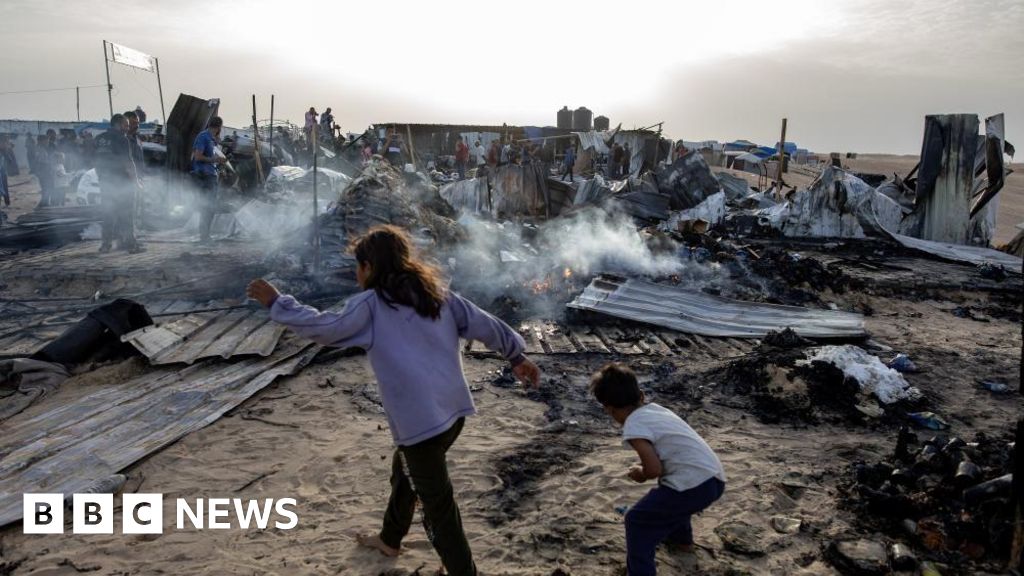Israeli Prime Minister Benjamin Netanyahu vowed to continue the war against Hamas, as the international community condemned an airstrike that killed dozens of Palestinians in Rafah on Sunday.
At least 45 people were killed and hundreds more were treated for severe burns, broken bones and shrapnel wounds, according to the Hamas-run health ministry.
Speaking in the Knesset, Netanyahu said the attack was a “tragic accident” but added: “I do not intend to end the war until all goals have been achieved.”
He said it was crucial that Israel take “all possible precautions” to protect civilians and insisted that the IDF was doing its best not to harm those not involved in the conflict.
At Algeria’s request, the United Nations Security Council will hold an emergency meeting on Tuesday to discuss the Rafah attack.
U.N. Secretary-General Antonio Guterres said in a statement on Monday that the attack “killed dozens of innocent civilians who were simply seeking refuge from this deadly conflict.”
“There is no safe place in Gaza. This terror must stop,” he said.
Mr. Netanyahu’s speech was punctuated by occasional questioning from family members of hostages taken by Hamas during the Oct. 7 attack, some of whom criticized him for failing to reach an agreement to return their loved ones.
“In Rafah, we have evacuated approximately one million non-combatant residents and despite our best efforts not to harm non-combatants, unfortunately something went tragically wrong,” he insisted.
“We are investigating the incident and will reach a conclusion as that is our policy.”
International organizations have condemned the attack, with the European Union insisting that Israel respects last week’s ruling by the International Court of Justice (ICJ) to halt the attack on Rafah. The EU’s top diplomat, Josep Borrell, called Sunday’s strike “shocking”.
Israel has pledged to continue its invasion of Rafah despite the ICJ ruling, which officials insist leaves room for the attack to comply with international law.
UN High Commissioner for Human Rights Volker Turk said the attack showed “no significant change in the methods and means of warfare used by Israel, which have led to the death of so many civilians”.
Israel launched the Rafah attack on Sunday, hours after Hamas launched its first missile attack on Tel Aviv in months.
An attack on Rafah killed two senior Hamas commanders and the IDF is investigating the deaths of civilians in the area, IDF officials said.
But the Palestinian Red Crescent said the airstrikes targeted tents for displaced people near the U.N. facility in Tal Sultan, about 2 kilometers (1.2 miles) northwest of downtown Rafah.
Video from the scene in the Thar Sultan area on Sunday night showed massive explosions and violent fires.
Footage showed buildings on fire next to a banner reading “Kuwait Peace Camp ‘1’” as first responders and bystanders carried several bodies.
Médecins Sans Frontières (MSF) said on Monday that one of its facilities had taken in at least 28 dead people, including women and children, after the attack.
The organization said it had treated an additional 180 injured Palestinians, most of whom suffered severe shrapnel wounds, fractures, trauma and burns.
MSF denied Israeli reports that the attack was accurate, saying “the attack on a densely populated camp within the so-called ‘safe zone’ of Rafah demonstrates a complete disregard for the lives of Gaza civilians”.
The United States called the images “heartbreaking” but insisted Israel had the right to defend itself.
“Israel has the right to go after Hamas, and we know that this attack killed two senior Hamas terrorists who were responsible for attacks on Israeli civilians,” the White House national security spokesman said.
But they acknowledged that “Israel must take all possible precautions to protect civilians”.
Israeli officials spent much of Monday scrambling to figure out what was wrong with Rafah. How did a “precision strike” using special munitions with “reduced warheads” trigger a storm that killed dozens and injured dozens more?
Israel knows the world’s eyes are on the incident following last week’s ruling by the International Court of Justice ordering Israel to cease any actions in the Rafah area that could cause further harm to the Palestinian people. It is under intense pressure to explain its actions.
The operation was said to have been carried out based on intelligence and it appeared that both Hamas members had been killed.
But the large presence of civilians and what appeared to be large quantities of flammable materials raise many questions about how the incident was planned and executed.
With senior military officials, including IDF Chief of Staff Maj. Gen. Ifat Tomer Yerushalmi, promising a thorough investigation, we can expect some sort of more detailed explanation soon.
But whether that marks a turning point in the campaign is another matter.
Mr Netanyahu remains committed to what he calls a “total victory” for Rafah, so there is no sign that Sunday’s disaster will change his mind.
Despite last night’s shocking scenes, Israeli ground forces still appear to be exercising some caution as they approach the city of Rafah.
So far, their actions have not resulted in a bloodbath.
But that’s exactly what last night’s airstrikes achieved, dealing another blow to Israel’s already tarnished image and weakening its case for continuing.
Israel’s military operation in Gaza began on October 7 after Hamas militants attacked Israel, killing about 1,200 people and taking another 252 people back to Gaza as hostages.
More than 36,000 Palestinians have since been killed in the war, according to the Gaza health ministry, which is run by Hamas.

